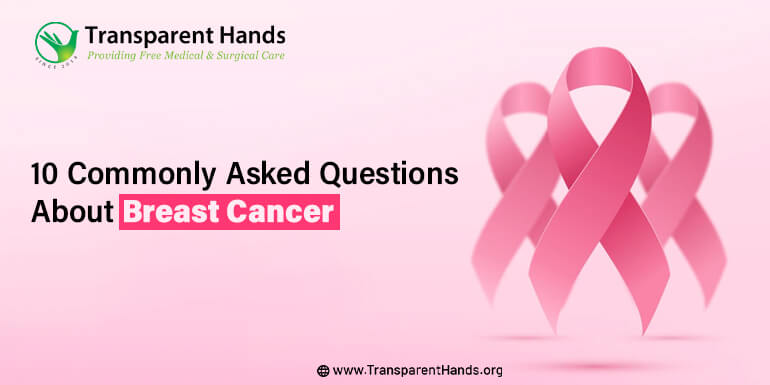10 Commonly Asked Questions About Breast Cancer

Overview
Breast cancer can develop in the left, right, or both breasts. Cancer occurs when cells in one or more parts of the body start to multiply uncontrollably. Several questions come to our minds when we hear the term breast cancer. We have shortlisted the ten commonly asked questions about it.
1. What are the early signs of breast cancer?
It’s important to keep an eye open for symptoms of it:
- Does one or both armpits have a bulge or inflammation?
- Is there an alteration in how the skin feels or looks?
- Does the skin around the nipple appear crusty, scaly, itchy, or reddish?
- Has the nipple changed its shape? Does it appear inverted?
If you seem to experience any one of these signs all of a sudden, pay a visit to a doctor immediately.
2. Is it a genetic disease?
If one of your family members had breast cancer, there is a 5% to 10% chance of you acquiring the problematic gene from them. Mutations in the BRCA1 (Breast Cancer gene one) and BRCA2 (Breast Cancer gene two) are linked to the majority of hereditary cases of it.
All people carry the BRCA1 and BRCA2 genes. The purpose of the BRCA genes is to maintain healthy cell growth and mend cell damage in the breast, ovary, and other tissues. However, the risk of developing breast, ovary, and other cancers rises when these genes have abnormalities handed down from one generation to the next.
Other factors that put women at risk of developing cancer include old age, reproductive history (such as periods before the age of 12), previous exposure to radiation therapy, etc.
3. Can perfume cause breast cancer?
There is no proof linking the use of scented items to higher cancer risk in people. Only doses that are several times greater than those found in consumer items are believed to cause cancer.
4. Can men also have breast cancer?
Although this cancer is prevalent among women, it occasionally affects men too. It can develop in the breast tissue that males have under their nipples. It rarely affects younger males. Out of every 100 cancer cases detected in the US, one is a male patient. The symptoms in male patients are somewhat similar to that of women. These include breast bulge or enlargement, flaking skin, redness, dimpling or irritation of the breast, discharge, the nipple getting pulled in, or discomfort.
5. Is only one breast affected or both?
It may begin in either one or both breasts. It can spread to the cells lining the breast, just like other types of cancer. Additionally, it might spread to other areas of the body and develop new tumors. Metastasis is the medical term used for this condition.
6. Is there a medicine available for breast cancer?
There are different categories of breast cancer medicines available for patients based on their stage. These include preventative medicines and treatment medicines.
7. Can I lower my risk of developing it?
Breast cancer can be discovered early on with routine check-ups and screening tests. Treatments are more effective at this stage. Regular check-ups and tests are the most important steps women can take. Breastfeeding, regular exercise, and maintaining a healthy weight are some of the ways to reduce the risk.
8. Can breast cancer surgery cause lymphedema?
Breast cancer surgery may have a side effect called lymphedema. This typically manifests in the arm or hand, though it can also occasionally affect the breast, chest, armpit, or back. These lymph nodes drain lymph from the breast, and this is why the it has a propensity to migrate into the underarm lymph nodes if that happens.
9. Can Breast Cancer come back after treatment?
The cancer that returns after the first therapy is referred to as recurrent breast cancer (RBC). Even though the primary course of treatment aims to eradicate every cancerous cell, some may escape and persist. RBC develops as a result of these cancer cells growing unnoticed. After the primary treatment, RBC may develop months or even years later. Cancer may return locally (local recurrence) in the same location as the initial malignancy or travel to other parts of the body (known as distant recurrence).
10. Is breast cancer fatal?
The prognosis depends on the stage of cancer at the time of diagnosis. The survival may also depend on cancer’s characteristics and the cancer cells’ grade. Early-stage patients frequently effectively manage their illness with treatment. A lot of people who are diagnosed with cancer go on to lead full, productive lives. Nevertheless, late-stage can be deadly and is harder to cure.
The likelihood of survival is also influenced by a person’s general health and wellness level; the more fit someone is, the better they may be able to handle the cancer treatment.
The financial constraints faced by a cancer patient matter as well. Since cancer treatments can be expensive, many people die every year because they cannot afford to pay for them. Underprivileged patients in Pakistan have a ray of hope in the form of a charitable organization that provides free diagnostic tests, breast cancer surgeries, and chemotherapy. Support Transparent Hands with your donations to help thousands of breast cancer patients all across Pakistan.
Related Articles:
(The information in this article should not be taken as a substitute for professional medical advice)










Leave a Reply